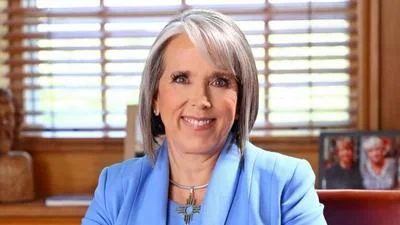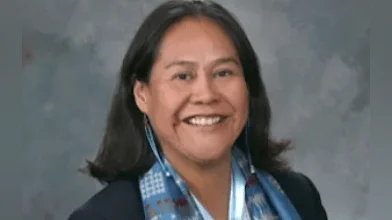Whitney Holland, president of New Mexico’s branch of the American Federation of Teachers, is keeping a close eye on New Mexico legislators this session.
The session opened Jan. 18 and will run for 30 days. Legislators will focus on the state budget, while also considering bills on crime, education, public health policy and legal cannabis.
Education bills are the focus for Holland and her team.
“AFT New Mexico maintains a full-time presence in Santa Fe for the duration of the session, and we are actively advocating for our educational and labor agenda,” Holland said in an email to members and supporters.
She noted the New Mexico House of Representatives passed House Bill 2 on a bipartisan vote of 56-13 on Feb. 3. The state’s coffers are full, allowing lawmakers to approve a nearly $8.5 billion package that will raise pay for teachers, fund college scholarship programs and provide for road repairs across New Mexico. It moves onto the state Senate.
Holland summarized the following elements of the bill:
Teacher tier minimums are funded for $50,000, $60,000 and $70,000 for levels I-III, respectively.
Additional compensation increases for educators (3%) in districts who participant in extended learning time programs or K-5+.
No language mandating extended learning or K5+, which keeps these decisions in local communities, based on educator, parent and school board input.
Funding for the state equalization guarantee to provide a $15/hour minimum wage for K-12 hourly employees.
Funding to provide a $15/hour minimum wage for higher education hourly employees.
Funding for a 3% salary increase beginning April 1 for all public school personnel, including transportation and higher education staff.
Funding for an additional 4% average salary increase for all public school personnel in fiscal year 23, including transportation and higher education staff.
The 7% total compensation funding, according to the New Mexico Public Education Department, that includes enough for third party contracted public educators (most often transportation services) and those contracting districts would be able to cover those increases when contracts are placed for bids.
$10 million to use as flexible pay for increases at local levels, including hard-to-staff positions and to combat compaction issues, which could include equalizing salary increases for ancillary staff in our schools.
$20 million for an additional 1% employer-paid contribution to the educator pension fund (ERB).
$43 million for culturally and linguistically appropriate instructional materials for eligible students, including dual-credit instructional materials and educational technology.
$10 million for career technical education initiatives and equipment.
$11 million for increase funding for paid residencies for incoming educators and stipends for student teachers.
$8 million for increased implementation of New Mexico community schools.
$50 million for endowed faculty positions at educator preparation programs at New Mexico public and tribal higher education institutions.
$50 million for endowed faculty positions in bachelor and master’s degree social worker programs at New Mexico public and tribal institutions of higher education.
$53 million for the Opportunity Scholarship which seeks to provide free public higher education for all New Mexico students.
$500,000 for continued funding of the Grow Your Own Educators Act.
Holland said there is more work to be done in the Senate.
“We are fighting for more funding for health care coverage to help offset increases in costs to premiums on the employee side to enact Senate Bill 101 or House Bill 59,” she said. “The current funding in HB 2 is to cover the increase costs to employers. We are advocating for increases to funding sources [currently at $10 million] for ancillary staff in our schools to provide equitable raises.”
The teachers also support additional funding to fully enact SB 132, should it be passed by the Legislature, to provide a minimum wage of $20,000 for educational assistants in public schools.
Holland said they are trying to make their voice heard across the state.
“To help support our efforts to increase health care coverage, minimum wages, and extra flexible funding for ancillary educators, we are launching a social media campaign to highlight the stories of educators who would be impacted by these changes,” she said.
There are other bills of note.
House Bill 13/a to expand the already successful efforts of New Mexico to establish and grow a paid teacher residency program for aspiring teachers who wish to enter the profession.
“Among the bill’s provisions are a full-year, paid residency for final-year college of education students, stipends for mentoring teachers and supports for district administrators who have residency students in their districts,” Holland said.
Senate Bill 41/a to provide a technical fix to existing statute that impacts a narrow subset of hospitals organized under the University Research Park and Economic Development Act (URPEDA).
SB 41/a would ensure these healthcare workers will be allowed to organize as public employees under the tenants of PEBA, Holland said.
Holland, a third-grade teacher in Los Alamos, was chosen to lead AFT NM on July 3, 2021. Kathy Chavez was elected executive vice president during the group’s biannual convention in Albuquerque.
“After nine years of local and state service to AFT NM, I am humbled to step into this important role," Holland said. "After a year of unprecedented challenges created by the ongoing pandemic, I will continue to be a strong voice for both our students and the tens of thousands of professional public educators represented by our union across New Mexico.
“Even though our union has new leadership, we will remain rooted in our values of a strong, vibrant, and equitable public education for all students, fairness in our communities and places of work, and progressive public policy for our state." she added. "The trust placed with me by my peers and fellow educators will not be taken for granted, and I am ready to get to work and create a modern, accessible, transparent, and inclusive union for our members and future members.”









